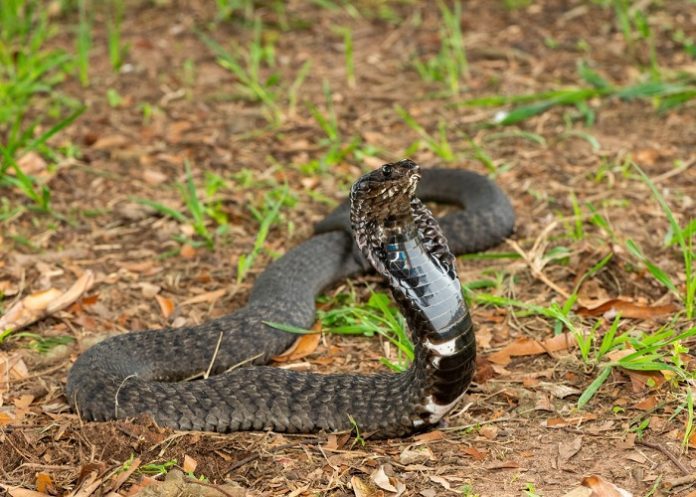An experimental recombinant anti-venom to protect against bites from some of Africa’s deadliest snakes including mambas, cobras and rinkhals has shown promise. The findings, published in Nature, may contribute to the development of safer and more effective treatments for snakebite victims, say the scientists.
Snakebites kill thousands of people every year in Africa, mostly farmers, herders and children in rural areas far from hospitals. Many survivors lose limbs or sight after delayed or inadequate treatment.
But this new breakthrough could transform this long-ignored crisis, reports The East African.
A team of scientists from the Technical University of Denmark has developed the world’s first fully lab-made, recombinant anti-venom that neutralises the poison of 17 of the deadliest snakes, including cobras, mambas and puffadders.
Traditionally, scientists produce anti-venoms by injecting small doses of snake venom into animals, usually horses or sheep, through a century-old process.
Over time, the animal’s immune system learns to produce antibodies that neutralise the venom’s toxins. Once enough antibodies have formed, blood is drawn from the animal, and the plasma containing these antibodies is extracted and purified.
This method results in a product with great variation in quality and a risk of serious side effects.
“The anti-venom works, but can cause harmful side effects – it’s similar to a blood transfusion from a horse. At the same time, the quality varies because different horses are used in each production,” said Professor Andreas Hougaard Laustsen-Kiel, who led the research team.
“Instead, we have developed an anti-venom that does not require us to constantly extract antibodies from animals, using phage display technology to develop our anti-venom.
“This method makes it possible to select and copy effective antibody fragments (nanobodies) and later produce them on a large scale and with consistent quality. This means that we would be able to produce the anti-venom in large quantities without compromising on quality.”
The new antidote is designed entirely in the lab using nanobodies, tiny engineered proteins modelled on camel and llama antibodies. These nanobodies can be replicated precisely, stored safely without refrigeration, and customised to target the specific toxins that cause paralysis, bleeding, or tissue destruction.
The recombinant formula has already shown powerful results in laboratory studies. In animal tests, it prevented death and severe tissue damage after exposure to venom from snakes common in South Africa, Kenya, Tanzania and Nigeria, among other countries.
Even more striking, it performed better than the commercial plasma-derived anti-venoms currently used in Africa.
“This could be a game-changer for Africa,” Laustsen-Kiel, said. “For the first time, we have a path toward affordable, stable and broad-coverage anti-venom that doesn’t depend on animal serum or expensive cold-chain systems.”
If scaled for production, the new model could allow African countries to manufacture anti-venom locally, reducing dependence on imported plasma-derived products that often fail to match regional snake species.
The anti-venom also penetrates tissue faster and deeper, helping prevent severe local damage even when treatment is delayed. And because nanobodies are smaller and more stable than conventional antibodies, they can be stored without refrigeration, making them ideal for use in remote African clinics.
The next phase will involve human clinical trials and regulatory evaluation before the anti-venom can be distributed widely.
The published lab results show that the treatment successfully neutralised venom in 17 out of 18 species tested, falling short only on one of the green mambas.
Also, although the potential impact is enormous, the scientists note that some venoms, particularly from black mambas and forest cobras, were only partially neutralised, underscoring the need for further refinement before clinical trials.
Study details
Nanobody-based recombinant anti-venom for cobra, mamba and rinkhals bites
Shirin Ahmadi, Nick J. Burlet, Melisa Benard-Valle et al.
Published in Nature on 29 October 2026
Abstract
Each year, snakebite envenoming claims thousands of lives and causes severe injury to victims across sub-Saharan Africa, many of whom depend on anti-venoms derived from animal plasma as their sole treatment option. Traditional anti-venoms are expensive, can cause adverse immunological reactions, offer limited efficacy against local tissue damage and are often ineffective against all medically relevant snake species. There is thus an urgent unmet medical need for innovation in snakebite envenoming therapy. However, developing broad-spectrum treatments is highly challenging owing to the vast diversity of venomous snakes and the complex and variable composition of their venoms. Here we addressed this challenge by immunising an alpaca and a llama with the venoms of 18 different snakes, including mambas, cobras and a rinkhals, constructing phage display libraries, and identifying high-affinity broadly neutralising nanobodies. We combined eight of these nanobodies into a defined oligoclonal mixture, resulting in an experimental polyvalent recombinant anti-venom that was capable of neutralising seven toxin families or subfamilies. This anti-venom effectively prevented venom-induced lethality in vivo across 17 African elapid snake species and markedly reduced venom-induced dermonecrosis for all tested cytotoxic venoms. The recombinant anti-venom performed better than a currently used plasma-derived anti-venom and therefore shows considerable promise for comprehensive, continent-wide protection against snakebites by all medically relevant African elapids.
The East African article – Lab-made snake anti-venom could end Africa’s crisis (Restricted access)
See more from MedicalBrief archives:
Snakebite anti-venom crisis fuelled by ‘useless’ medicines
Anti-venom failure leads to novel toxin immunology discovery

